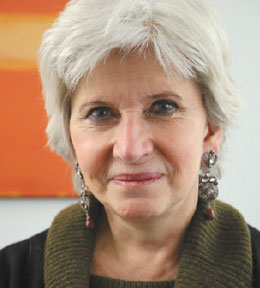Eyes on China for UN climate change conference in Paris
China is one of the most important factors in establishing a new global agreement on climate change, said Laurence Tubiana, France's climate change ambassador and special representative for the 21st session of the Conference of the Parties to the UN Framework Convention on Climate Change.
Tubiana made the comments in an exclusive interview with China Daily prior to French Prime Minister Manuel Valls' trip to China.
Valls said on Wednesday that Beijing has a crucial role to play in the international climate talks being held in Paris in December, adding it was the key issue up for discussion during his three-day visit.
"2015 will be a crucial year with the COP21 conference being held in Paris, during which a strong and lasting accord must be agreed to address the environmental emergency," Valls told Xinhua News Agency.
"By committing to reducing greenhouse gas emissions last November, China has already taken the first step," he added in comments made available to Agence France-Presse.
Tubiana said all eyes will be on China at the conference in Paris later this year to see "what debate China will have and what contributions it will make". The opportunity is there for China to take the lead in efforts to combat climate change, she added.
The special representative said she believes that China has contributed to improvements in global energy sustainability. "I have found that in recent years, efforts by China to defeat climate change have improved. The Chinese government is working very hard on it," she said.
"Solar panels are 10 times cheaper than 10 years ago. China has delivered much cheaper panels that are benefiting many countries," she noted.
The momentum that China can inject into global climate negotiations will inspire other countries to come forward with their own actions, she said.
As the conference host, Paris has already made efforts to establish coordination among developing countries and seek new financial tools for green energy investments, according to Tubiana.
At the 2009 UN climate change conference in Copenhagen, leaders from around the world, including China, failed to reach a global deal to tackle climate change.
In 2011, leaders agreed in Durban, South Africa, to start negotiations towards establishing a new and universal greenhouse gas reduction agreement with legal force by 2015.
The Durban conference also created the Green Climate Fund to help poor countries adapt to climate impacts and reduce their greenhouse gas emissions.
"This new agreement is expected to be adopted in 2015 at the Paris climate conference and implemented from 2020 on," Tubiana said.
The 2015 agreement is expected to be a single comprehensive deal that will combine the current patchwork of binding and non-binding agreements.
China, the United States and Europe will be the three largest players at the conference in Paris, said Tubiana.
She said French leaders must "understand what China's concerns are".
"France needs to listen and communicate with China to know what China can improve upon and what achievements it has made that is worthy of praise," she said.
Though scientists have long proven that climate change is caused by human activities, many countries are still not meeting the agreement hammered out at the Warsaw conference in November 2013, Tubiana said. The agreement called for preparation to reduce or limit carbon emissions by 2015.
Based on the consensus in Warsaw, many countries will announce their commitment and contributions to keeping global temperatures at 2 C by the first quarter of 2015 and no later than this summer. But Tubiana said not all countries are following the same timeline.
"For those countries which haven't made announcement decisions, we are trying to help them launch a detailed schedule as early as possible," said Tubiana.
Announcements by the European Union, the US and China came earlier than expected, she added.
According to a proposal by the European Commission, the EU is considering setting a 2030 emissions reduction target of at least 40 percent below 1990 levels.
Joint efforts urged
In November 2014, President Xi Jinping and US President Barack Obama announced their post-2020 actions to reduce carbon emissions. The US intends to reduce emissions by up to 28 percent below 2005 levels in 10 years.
China expects its CO2 emissions to peak by 2030 and the nation intends to increase its usage of non-fossil fuels to about 20 percent by 2030.
Tubiana said the key problem for China is coal.
"We need joint efforts to see what we can do to make another energy source competitive to coal," she said.
China can borrow from the experiences of European countries to create a sustainable energy industry, said Tubiana.
China could lead the charge in fighting climate change because its pathway could become a future model for many developing countries.
AFP contributed to this story.
tuoyannan@chinadaily.com.cn
|
Laurence Tubiana, special representative for the 21st session of the Conference of the Parties to the UNFCCC. Tuo Yannan / China Daily |



















